On Wednesday, May 10, the doors of Leafoods' vertical farm were officially opened and inaugurated with a ribbon-cutting ceremony. The farm is set to deliver its first products by the end of this week. By the end of this year, they aim to produce about 1000kg of lettuce a day. For now, they are supplying lettuce, leafy greens, and herbs to the Lithuanian market, 'which is said to consume a large chunk of greens on a daily basis.'
Click here to view the photo report.
Valentinas Civinskas, CEO and Co-founder of Leafood, shares, "I'm so proud to be able to contribute to the end consumer being able to contribute to their daily life and health. It's quite motivating for me. We import about 70% of lettuce now, but we want to be able to reduce that number by offering one ton of lettuce eventually around the autumn of 2023."
As Valentinas let slip, Leafood is definitely interested in growing berries about three to five years from now and opening a new facility to be able to cultivate these crops. "Yet, we're not sure what the end consumer is willing to pay for the product as it's now about 3-5 times more expensive than what's available through imports."
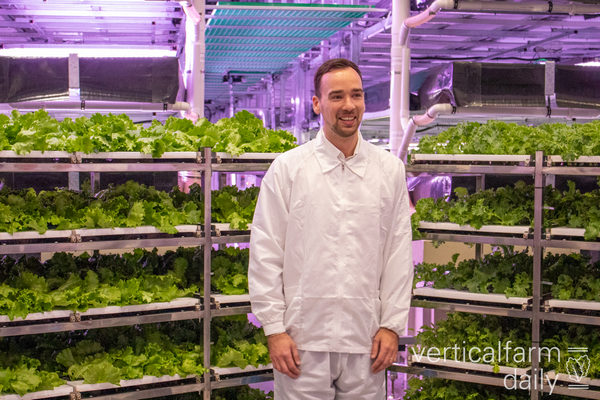
Valentinas Civinskas
10-30% more expensive than conventional
Looking at the end product, Leafood is not really pitching that their products are vertically farmed products, but more the high-quality produce that the market is ready for. Valentinas has been in conversations with multiple retailers and signed a contract with IKI to supply over 100 stores in the country starting this Friday onwards. "Now we're talking about the strategy, how to approach customers. That is key because others are failing because they don't seem to do that."
For now, the focus is to supply the products at 10-30% higher prices than the same products that come from conventional farming. "Our products have to be available at an accessible price. Later, we can always increase prices when people really understand the quality and consistency of our products. We're now very close to conventional product prices as it's all about accessibility."
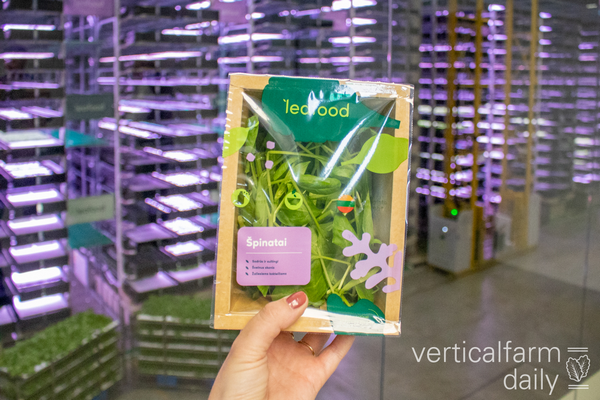 Leafoods' spinach packaging
Leafoods' spinach packaging
What's paid for lettuce in retail?
Having looked at the availability of lettuce mixes and spinach in retail (Maxima express), a 100-gram bag of spinach costs 1,45 euros. Meaning that Leafood's pricing would range from 1,60-2,00 euros. Mixed lettuces of 150 grams are available from 1,55 euros. Meaning that Leafood's pricing would range from 1,70-2,05 euros.
Click here to view the photo report.
'Walking them through every process'
"Since Leafood is a startup company YesHealth has been involved in everything from the start; the business plan, the upfront planning, and training to get everything started," says Stella Tsai, Group facilitator at YesHealth Group.
Ever since January this year, the team has been able to finish the farm within four months. About 20 people were flown in from Taiwan, plus 40 local people to finalize the construction. What makes YesHealth stand out compared to others, says Jesper Hansen, Business Developer at the company, is that they can offer farms at the lowest price but efficient at the same time. "As you can see, we can build farms at this size for less than five million euros."
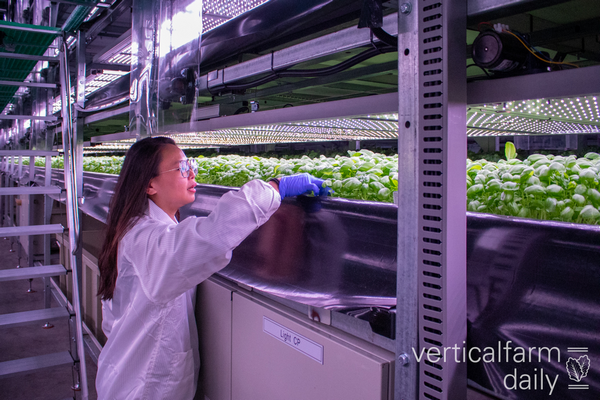
Stella Tsai pictured in the farm
Then, the product needed to be marketed. "We've been helping out with the selling points that you're selling to customers. You don't want to be compared to a regular product. Therefore, we've been involved with packaging and even sent the packaging back to Taiwan. The products were tested in cold storage, for instance, to check their durability of it. We really walked them through every process."
Now, the YesHealth team is educating Leafood's local operators to thoroughly aid them in every farming process, which is key, according to Stella. Not only is that done in person, but to better help all workers, the self-made warehouse management system of YesHealth allows for better task distribution that's entirely tuned to the farm.
Click here to view the photo report.
The efficiency of using gelponics
Stella is most proud of the gelponics that are used inside the farm, a substance that's used as a substrate for the plants to grow in. YesHealth's gelponics are completely plant-based and eventually dissolve when the water is at the right temperature. However, if the gel should still be on the roots when receiving the final products, no removal is needed because it's completely edible. The most convenient process in this farm is that transplanting is not needed. The lettuce grows to a certain size and stays in the gelponics throughout its entire lifecycle. Very little gel is needed to feed the plants up until they are ready to harvest.
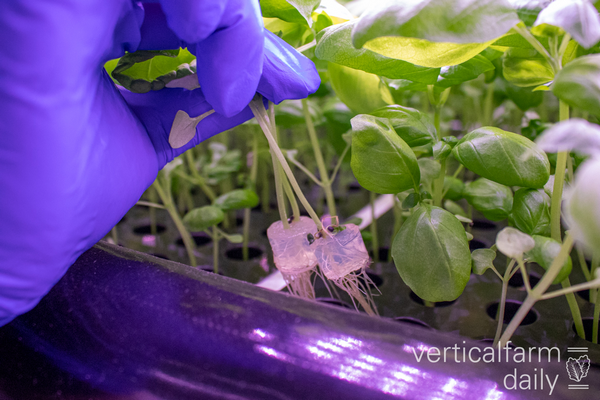
The difficulty of pushing sustainable initiatives
According to Niels Peter Pretzmann, the Main investor in Leafood and founder of Farmer Circle, it has taken a long time for the Lithuanian government to educate consumers on accurate food prices. In the earlier years, food was quite expensive in general and would consume about 30-50% of an income. Ever since 1985, the government has been lowering the cost of food. Yet, that's not always a good thing for the farmers as they don't always get paid as much as they should.
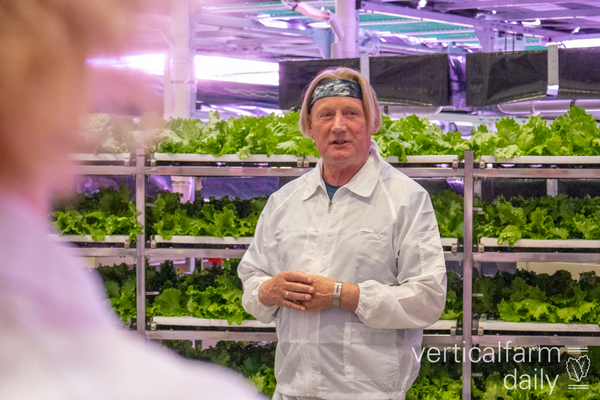
Niels Peter Pretzmann
Click here to view the photo report.
Purchasing power
"Perhaps it's time to charge the right prices for food? There should be fair competition between sustainable, healthy food and conventional food. This has yet to be brought into balance," Niels highlighted.
According to him, society has really taken it upon itself. "Consumers demand consistent year-round quality whenever they buy a fresh product in-store. It's time to find the perfect in the imperfect. Open-field products taste way different when freshly harvested than when buying it in-store as it's all filled with conservatives. Luckily, this vertical farm can partially complement the domestic supply of fresh veggies and herbs. We're going to make the most difference in the food miles as they have very short supply chains. I'd love to see multiple solutions coming in to fight climate change, and we should be less religious in everything we do."
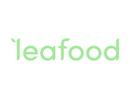 For more information:
For more information:
Leafood
[email protected]
https://leafood.com

YesHealth Group
www.yeshealthgroup.com
